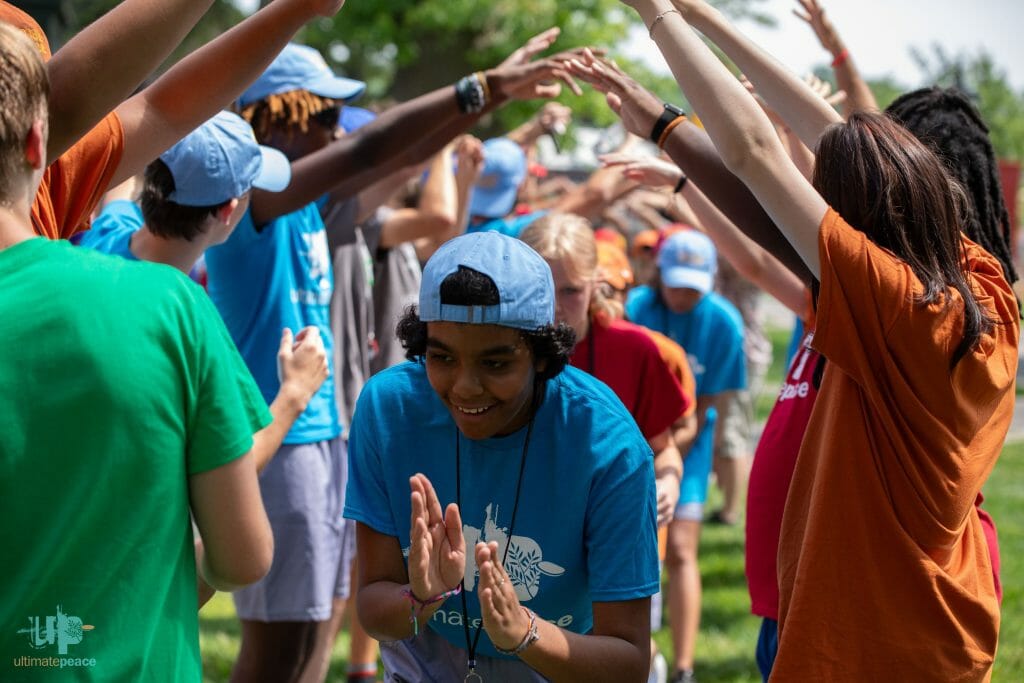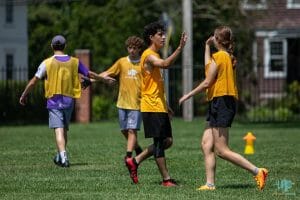Ultimate Peace aims to bring young players from diverse backgrounds together to learn about ultimate and life beyond the field through the five values of mutual respect, integrity, non-violence, friendship and fun.
July 11, 2023 by Adam Zagoria in Sponsored with 0 comments

LAWRENCEVILLE, N.J. — On an steamy early July day when the temperatures hovered in the mid-90s, six teams wearing various colored jerseys played ultimate frisbee on the immaculately groomed lawns at The Lawrenceville School.
On one field, Gio Gerber, a rising junior at Columbia High School in Maplewood, received the disc at midfield and hit his teammate, Amelia Darling, in stride with a 20-yard backhand that brought her close to the end zone. Darling, an Atlanta-area native who plays on an all-women’s high school team, then fired another backhand to teammate and fellow Atlanta native Rory King. King, who wears glasses and has been playing on the Decatur High School team for a year, dove for the disc and caught it in the end zone for a goal. Soon he was surrounded by teammates and opponents alike cheering in celebration.
“I mean, that was like my first layout ever, I’ve never had a better feeling in frisbee,” an excited King said. “I caught it and I couldn’t believe I did it and then I got up and everyone — even people from the opposing team — were like, ‘Oh my God, that was so cool, man.’”
Welcome to Ultimate Peace, a camp of 78 experienced ultimate players from 10 states and two First Nation reserves in British Columbia held during the first week of July. Ultimate Peace aims to bring young players from diverse backgrounds together to learn about ultimate and life beyond the field through the five values of mutual respect, integrity, non-violence, friendship and fun.
“So everything we do goes back to those values,” said 64-year-old San Francisco native David Barkan, who founded Ultimate Peace after a long and successful run as a club ultimate player that included winning a world championship with his team Double Happiness in 1995.
Barkan said the cost of Ultimate Peace is $1,000 per camper, and 75% of campers are on scholarships which covers the camp and travel. Much of the funding comes from private donations, including a sizable one from the Arthur M. Blank Foundation in Atlanta, which explains why 30 players from the Greater Atlanta Area were at the camp.
After 10 years of holding the camp in the Middle East, Barkan moved it to the U.S. for the first time in 2023. This year’s camp featured:
- Players from Columbia High School, which served as the birthplace of ultimate in the late 1960s
- An ultimate development program from urban San Francisco
- An urban high school team from Philadelphia
- Schools and club teams from the Greater Atlanta Area
- A First Nations ultimate program near Vancouver
- A rural high school team from Massachusetts
- An urban high school team in Pennsylvania
“It’s our first U.S. camp,” said Barkan, who rides around camp on a bicycle when he’s not supervising lunch time speakers or the slip-and-slide. “The model was developed in the Middle East in 2010, and since then we’ve had 10 years of programming year round that essentially focuses on bringing kids that would never meet otherwise from different parts of the Middle East, the West Bank, Israel and surrounding areas within Israel, including Arab communities, Jewish communities that live next to each other but just don’t interact.”
As is the case with many things in ultimate — which was developed as an “anti-sport” in the late 1960s and to this day remains governed by the “Spirit of the Game” where players must resolve all foul calls on their own without referees — something that was born as tongue-in-cheek developed into something more serious and meaningful.
In the mid-1990s, Barkan, who is Jewish, organized a throw-together team of fellow Jews for an April Fool’s tournament on the West Coast. He called the group “Let Our People Throw,” which later morphed into the “Matzoh Balls” and won several tournaments. He also organized a mixed ultimate team for a Seattle tournament called “Jew-bilation” that featured top men’s and women’s Jewish ultimate players.
Ten years later he got a call from Dori Yaniv, an Israeli ultimate player, asking, “Hey, is it true that there’s this mythical Jewish ultimate team that wins all these tournaments and beats the best teams in the country?”
Yaniv told Barkan they would be hosting a beach ultimate tournament in Israel and could his team come?
“I called everyone and everyone wanted to go,” Barkan said. “So we did this tour in 2005 and we were on the beach and we did a tournament. It went really well but I felt like we could do more here. They loved it and I was like let’s do something with Arabs and Jews, not just the Jews, and so I talked to a lot of the Matzoh Ball folks and said, “Let’s do something.’”
After a decade of camps in the Middle East, Barkan said “it’s become more difficult politically to do the program in Palestine so now it’s only in Israel with Jews and Muslims there.”
On July 3, just as the first camp in the U.S. began in New Jersey, a reminder of the harsh realities of the real world emerged when Israeli forces launched what was called the largest military operation in the occupied West Bank city of Jenin in more than 20 years, reportedly killing at least eight people and injuring about 80 others.

More than 5,700 miles away, Gerber and the other Ultimate Peace campers were learning to coexist with young people they had never met before. The various groups from around the country were intentionally split up into six teams and given different colored jerseys. They had to learn to work together to form ultimate teams that would compete in a tournament at the end of camp. Away from the field, they participated in various activities including music, art and dance that led up to a talent show. The camp also featured a “Dialogue Club” where people can discuss “deeper issues,” Barkan said, as a well as a “Leadership Program” and a “Coach-in-Training Program.”
Ariela Ellman, who attends Columbia High School, said the biggest hurdles have been learning to speak a common language about ultimate and how each team should be organized. She used the phrase “Fire” when transitioning from zone to man defense in the middle of a point, but not all of her teammates used the same word.
“Lots of people have lots of different opinions about how we should play and what we should do,” Ellman said. “Style of play, how people want to communicate and just words in general.”
Each team has a coach who plays or played high level ultimate, some winning national and world championships (including one, Yina Cartagena, from Colombia who plays for the New York women’s semi-pro team Gridlock).
Dennis Karlinsky, a long-time club player from Seattle who played on Barkan’s all-Jewish teams, is one of the coaches who has been associated with the camp since they spent 10 hours a day on a beach in Tel Aviv with kids from the Middle East.
“The goal was if we can teach them just to see each other as kids and catch and throw a frisbee on the beach, good things will happen,” he said.
Now he’s prefers coaching to playing.
Each team at camp also has to develop its own leaders, which can be tricky in any group of peers. Gerber took over a leadership role on his Yellow team that was met with some resistance by his teammates.
“He’s very vocal,” Darling said with a laugh.
Darling plays on an all-women’s high school team in Atlanta, but had to adjust to playing with men at camp.
“I know that it’s different but people run at different speeds and genuinely the way people throw is different, and how you gauge whether or not someone’s open is different,” she said of mixed ultimate.
She added: “If you’e open and they [the men] don’t throw it, you just have to get open again.”
Christopher Peart, an 18-year-old from Maynard Holbrook Jackson High School in Atlanta, was one of a handful of African-American players from city schools at the camp. He had spent the week before camp helping his parents move by carrying furniture and said being at the camp was a lot easier. Still, it was so hot at camp, he walked around one day with an ice pack around his neck.
Although the sport has traditionally been dominated by white players, who sometimes are known to commit micro-aggressions against minority groups, he said he felt welcomed at the camp.
“There’s not too many African-Americans or other races who play ultimate, but I still feel connected because some of my best friends are white and it’s not really too big of an obstacle for me,” he said. “The African-Americans who do play ultimate, I feel like I have a deep connection with them because even though we’re a different race, we’re still able to establish a connection with the sport.”
Peart and all of the campers were given a connection to the history of the sport when Paul Schindel, who helped develop ultimate at Columbia High School in the early 1970s, spoke with the campers during lunch one day. He explained how he and his friends used to play under the lights in the famed Columbia High School parking lot in the early 1970s with a 165-gram black Wham-O Frisbee that would sometimes crack during winter night games. Today’s ultimate games are generally played with 175-gram white discs made by Discraft.
Schindel arrived with 496 such discs emblazoned with the logo, “CHS Varsity Frisbee: Birthplace of Ultimate.” He said the the number signified the street address where he and his brother, Larry, another ultimate pioneer, lived on Richmond Avenue in Maplewood.
“I am the ghost of ultimate past,” Schindel, 67, told the campers. “You are the ghosts of ultimate present and future.”
He added: “You probably have a bunch of discs. You don’t have one like this. So carry the Spirit of the Game wherever you go and keep ‘em flying.”
Across an ultimate career that has lasted more than 30 years, Adam Zagoria has competed in College, Open, Mixed, Masters, Grandmasters and Great Grandmasters Nationals. In 2013, he captained the Westchester Ultimate Summer League championship Gold team. His team also won the WSL title in 2011 and ’21. Zagoria is the co-author, along with Tony Leonardo, of “ULTIMATE – The First Four Decades.”